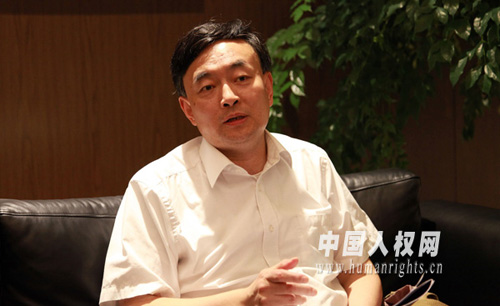September 14, 2017 -- The seminar titled “The Philosophy and Practice of Right to Peace in China”, which was co-sponsored by China Society for Human Rights Studies (CSHRS) and the Publicity Department of Jiangsu Province and organized by the Party School of Central Committee of Communist Party of China (CPC) and Nanjing University, was held in Nanjing on Monday. Professor Liu Cheng, director of the Institution of Peace Studies, Nanjing University, gave an interview with Chinahumanrights.org after delivering a speech titled “Peace Issues in the Context of Peace Studies” at the seminar.

September 14, 2017 -- Liu Cheng, director of the Institution of Peace Studies, Nanjing University. Photo/Jiao Fei.
Chinahumanrights.org: Could you please give us a brief introduction of the contents and features of China’s philosophy of the right to peace.
Professor Liu: I think the right to peace involves two aspects: peace and human rights, and in China the right also involves Chinese traditional culture. If you look at the Chinese characters of “peace”, you will find China’s philosophy of right to peace includes people’s right to subsistence, social stability and the right to development. All of the three elements can be found in Chinese traditional culture such as Confucianism and Mohism.
Chinahumanrights.org: What are the challenges of realizing the right to peace? What measures has China taken to safeguard the right for people in China and all over the world?
Professor Liu: The Declaration on the Right to Peace was adopted by the United Nations in 2016 and most countries including China voted in favor while some western countries such as the US voted against it, which is a huge challenge. China, with a population of 1.3 billion, lags behind western counties in development. However, tremendous achievements have been obtained in China since the adoption of reform and opening-up policy. We have realized the historical leap from living on barely enough food and clothing to leading a relatively comfortable life. This remarkable success is not only of great significance to China, but also to the world. Today many countries are still struggling in poverty and China’s success has provided a model for them.
Chinahumanrights.org: The Belt and Road Initiative (B&R Initiative) is an important contribution that China has made to the world. Meanwhile in January, President Xi Jinping proposed the idea of building a community of shared future for mankind. What do the B&R Initiative and the proposal mean to the realization of the right to peace?
Liu Cheng: Western countries has come through the industrial revolution and developed into industrial society from agricultural society. Their road to success was accompanied by colonialism and imperialism. China, however, after decades of rapid development, not only grows stronger itself, but also wants to help those in poverty. Under these circumstances, President Xi proposed the B&R Initiative and the idea of building a community of shared future for mankind. The B&R Initiative is an initiative for peace and the latest expression of safeguarding the global right to peace. The proposal of the idea of building a community of shared future for mankind means that in the age of globalization all countries’ development is interconnected. We want to share development opportunities with other countries. Since the initiative and proposal have been greatly promoting the realization of the right to peace, more and more countries are now embracing them.
Chinahumanrights.org: Some western countries hold negative attitudes to the right to peace. What can we see from the different views on human rights between China and western countries?
Liu Cheng:Colonialism and imperialism emerged among western countries and have resulted in a culture of hegemony. They believe their philosophy of human rights is universal and want to impose it on developing countries. But they have neglected many basic contents of human rights such as the right to peace. The right to peace is an important human right, and nobody can negate people’s pursuit to peace. So I think the difference between China and western countries in understanding human rights is caused by historical and cultural reasons.
Chinahumanrights.org: Some western countries have been making groundless accusations against China's human rights records and try to contain China with human rights issues. Do you think China’s advocacy of the right to peace will change the situation and give China more say on the international arena?
Liu Cheng: Western countries are holding that their philosophy of human rights is universal. If they really believe so, they should admit the right to peace and join hands with China to safeguard it because the right to peace is also universal. Unfortunately, they voted against the Declaration on the Right to Peace, which means their human rights philosophy is not universal. Their so-called “universal” is based on their history, culture and national interests. We believe that peace is a common pursuit beyond culture and nationality. It is the ultimate goal and a true universal right.


